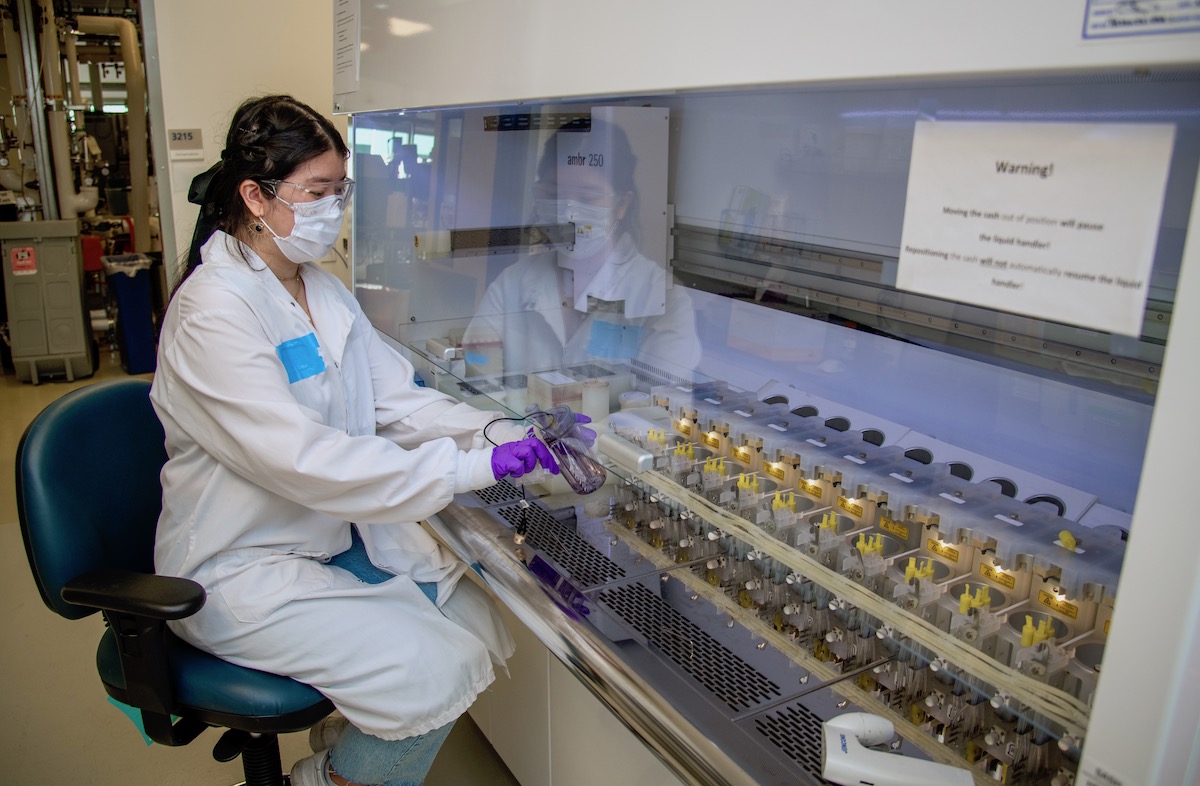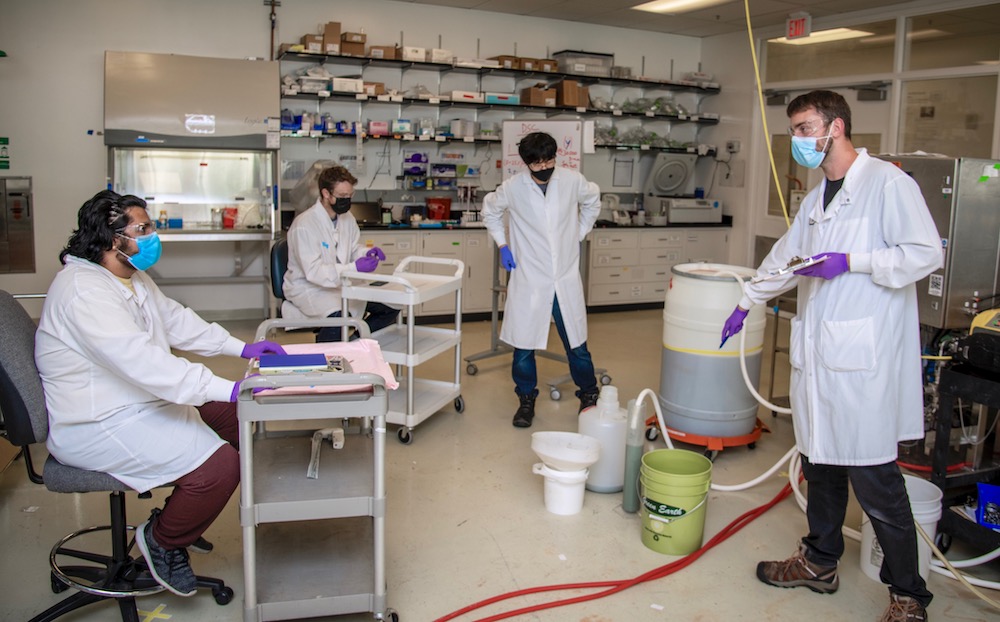
Tiffany Chen, a UC Berkeley chemical engineering student, loads a sample into the AMBR 250 device as part of UC Berkeley’s “Advanced Bioprocess Engineering Laboratory” class, which introduces advanced concepts of bioprocessing to chemical engineering students, at Berkeley Lab’s Advanced Biofuels and Bioproducts Process Development Unit in Emeryville, California. (Credit: Thor Swift/Berkeley Lab)
-By Emily Scott
Jason Ryder is the first to tell you that the world is facing several crises. Most notably, we face a health crisis in the form of a global pandemic, as well as an ongoing climate crisis that threatens our environment and ecosystem. And as the world population continues to grow, we also face a food crisis as more and more people need access to better and more nutritious foods.
But Ryder, an adjunct professor in UC Berkeley’s College of Chemistry, is an optimist. He knows we have the tools to solve these problems: biotechnology and bioprocessing — using the power of biology to generate sustainable, bio-based chemicals, fuels, materials, and food products. Scientists have harnessed this power by using microbes to produce almost anything imaginable, such as plant-based “meat” products or bio-derived clothing dye that replaces traditional petroleum-derived dye. Products like these are a key part of the bioeconomy, a rapidly growing sector of the global economy centered around reducing our dependence on fossil fuels.
While the possibilities of biotechnology are staggering, the bioprocess industry is facing a surging demand for experienced people to develop and scale processes that bring these bio-based products to market.
“There is a great need for bioprocess engineers in synthetic biology, biotechnology, and pharmaceutical companies and a dearth of trained bioprocess engineers,” said Jay Keasling, a senior faculty scientist at Lawrence Berkeley National Laboratory (Berkeley Lab) and professor in UC Berkeley’s College of Chemistry. “As such, companies must train them on the job, which is not ideal for the company or the individual.”
That problem is the driving force behind UC Berkeley’s Master of Bioprocess Engineering (MBPE) program, which Ryder directs, as well as the Advanced Bioprocess Engineering Laboratory, a new capstone course in the program taught by Keasling that takes place at Berkeley Lab’s Advanced Biofuels and Bioproducts Process Development Unit (ABPDU). The course prepares students for careers in the biopharmaceutical, industrial biotech, or food tech industries by giving them much-needed hands-on experience with bioprocessing equipment.
“As a bioprocess engineer, you need to be able to confidently say, ‘I understand living cells, the bio-based products they make, and how to build processes around them. I can design these systems, put them together with my own hands, clean and run them,’” Ryder said. “When you can say this, then you are ready to go do it.”
The course arose from a discussion between Ryder and the College of Chemistry’s MPBE Industrial Advisory Board, made up of global leaders in the biotech and biopharmaceutical industries.
“If you were to design a curriculum that would prepare someone to join your company,” he asked the board, “what would it look like?”
The board identified five key pieces of bioprocessing equipment that are commonly found in the industrial biotech, food tech, and biopharmaceutical industries. These unit operations span the production of bio-based products via fermentation through their recovery, separations, and purification.
Ryder then found a solution that got students’ hands on this equipment with the help of the ABPDU, a bioprocess scale-up facility at Berkeley Lab that collaborates with industry and academia to enable early-stage advanced biofuels and bioproducts, with funding support from the U.S. Department of Energy Bioenergy Technologies Office.
The ABPDU, which houses these five key pieces of equipment, then developed a curriculum that eventually became UC Berkeley’s Advanced Bioprocess Engineering Laboratory course.
In the course, students spend time at the ABPDU to get hands-on experience in the lab with this equipment. Not only do they learn important skills such as how to set up and safely operate the equipment, they also perform experiments that expose them to all the main steps of bio-based processes, including fermentation, product purification, and more.

Vedant Vaidya (far left, seated), and Nathaniel Kemmerer (middle left, seated), both UC Berkeley chemical engineering students, listen to ABPDU scientists Asun Oka (center right, standing) and Jan-Philip Prahl (far right, standing).
“This course gives students crucial firsthand experience with industry-relevant equipment,” said Jan-Philip Prahl, a senior process engineer at ABPDU and a guest instructor and on-site supervisor for the course. “This is all larger scale equipment that is almost impossible to find in an academic setting.”
Due to the pandemic, in-person lab sessions were moved to the second half of the spring semester. To prepare for these sessions, students studied standard operating protocol videos developed by ABPDU staff and attended guest lectures given by equipment manufacturers, ABPDU staff, and UC Berkeley professors.
“It’s rare to find the combination of equipment and expertise that we have at the ABPDU. Our experience working with over 65 companies on novel technologies, along with our fermentation and downstream process development capabilities — from our Ambr system and 300 liter bioreactors to centrifugation and chromatography — allowed us to develop this one-of-a-kind course,” said Deepti Tanjore, director of ABPDU. “There isn’t another course out there that is as comprehensive and also has video standard operating protocols, on-site training, and guest lectures from equipment vendors and industry experts.”
The hope is that students will be prepared to make this next step into industry, as was the case for Tiffany Chen, a student in the MBPE program who was enrolled in the course at ABPDU this spring.
“It’s nice to be able to take what you’ve learned in course and see it in action. I feel really comfortable with the equipment now,” Chen said. “During interviews I’ve had, interviewers were surprised to see that I had experience with this equipment.”
Hiring managers in industry agree. “It’s difficult for students to get exposure to large-scale systems or even to smaller bioreactor systems, which can be quite expensive,” said Deborah Pascoe, Vice President of Operations at Culture Biosciences, a biotech company based in the Bay Area. “This course gives students an opportunity to interact with industrial technologies and be better prepared for work on day one.”
That’s good news for Ryder and Keasling, who see students making it into industry as a measure of the MBPE program’s success.
“The bioprocess engineers who come out of this program will easily find great jobs and become leaders in the field,” Keasling said.
Ryder said there is an extraordinary amount of interest in biotech among students today, giving him hope that the major crises of today can be addressed and ultimately solved.
“That’s why it’s so important for students to understand early in life what possibilities are out there,” he said. “Industry is responding to these crises we’re facing, and many companies are taking advantage of biotechnology and bioprocessing to create solutions — COVID-19 vaccines, as one example. At the same time, new opportunities and fields are popping up all the time, and they need experienced bioprocess engineers as well.”
Developing that workforce to enable the bioeconomy is a key part of ABPDU and Berkeley Lab’s work, said Mary Maxon, Associate Laboratory Director of Berkeley Lab’s Biosciences Area.
“For the past decade, the ABPDU has not just been helping industrial entities scale up their technologies but also training the skilled workforce necessary for rapid growth in the bioeconomy,” Maxon said. “As part of the University of California system, Berkeley Lab understands that education and workforce development are integral to a successful and vibrant future bioeconomy, and we are doing our part to help.”
# # #
Founded in 1931 on the belief that the biggest scientific challenges are best addressed by teams, Lawrence Berkeley National Laboratory and its scientists have been recognized with 14 Nobel Prizes. Today, Berkeley Lab researchers develop sustainable energy and environmental solutions, create useful new materials, advance the frontiers of computing, and probe the mysteries of life, matter, and the universe. Scientists from around the world rely on the Lab’s facilities for their own discovery science. Berkeley Lab is a multiprogram national laboratory, managed by the University of California for the U.S. Department of Energy’s Office of Science.
DOE’s Office of Science is the single largest supporter of basic research in the physical sciences in the United States, and is working to address some of the most pressing challenges of our time. For more information, please visit energy.gov/science.